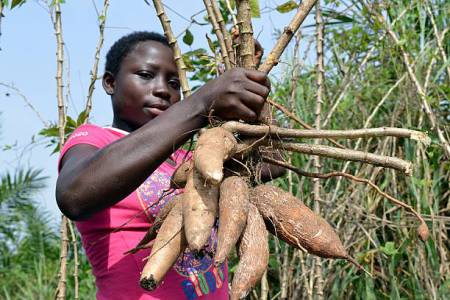Cassava farming (Manihot esculenta ) is the hub of Kenya economy and stunning enough, we are known as one of the largest producer in the world.
You might be asking, how did Kenya become one of the major producer of cassava? Let me take you back to history.
Cassava is originally from South America , but during the slave trade, a lot of slaves were taken away to work in farms. It was this that set the path we’re into now. When most of these slaves returned, they were able to introduce this produce, including its techniques.
Page Contents
CASSAVA FARMING
Cassava Farming Business? Not everyone would love to hear of that. An average Kenyan believe that cassava farming is an archaic practice that should be abolished. They’d beam with smiles to the hearing of working in an oil company, but grow in rage whenever agriculture is mentioned.
It’s saddening. I see people go hungry every day.
Some, in their quest to fill their stomach indulge in illegal practices that only endanger their life.
For the first time in history, office workers delve into cassava farming because their salary wasn’t enough to meet the new development. Cassava suddenly became a high sought after good – a holy grail.
Cassava can be processed into a number of products like starch, glucose syrup, chips, flour etc. In fact, cassava makes up a major part of our daily meal here in Kenya.
Raining season is fast approaching and the best time to start preparing for this farming business in now, which is why this article is coming at this moment.
In this article, I’m going to guide you by the hand on how you can start cassava business here in Kenya.
Not only will you make huge amount of money in return, you’ll save yourself money.
REASONS WHY YOU SHOULD START CASSAVA FARMING IN KENYA
1. HIGH DEMAND
The population of Kenya is over 50 million and over 99% consumes cassava products every day. The demand will continue to skyrocket as cassava farmers dwell in financial freedom.
2. AGRICULTURAL LOANS
Bank of Agriculture (BOA) has now made more agricultural loans, to help attract more Kenyans into taking a part in cassava farming.
This incentive offered has eliminated the excuse of not having capital. Follow the due process and you’ll qualify. There are also some commercial banks here in kenya that give agricultural loans.
3. NOT TECHNICAL
Cassava farming is not technical in any way. I’m currently into this agribusiness and I can confidently beat my chest and say that it’s the easiest agribusiness you can ever do.
4. SMALL CAPITAL
Another remarkable truth about cassava farming is that it’s not capital-intensive as long as you already have a land. Even if you don’t, you can easy rent. It’s a low capital business . You might not even need the incentives offered by BOA before you can do this business.
Read also: How to Start Cashew Nut Business
USES OF CASSAVA
Cassava can be used by farmers as livestock feed
Bye-product of the root and leaves of cassava can be process into different form of starch that’s very edible
Used for the making of some natural herbs.
HOW TO START CASSAVA FARMING
1. A GOOD FARMING SITE
It’s advisable you get a land never close to your resident for easy monitoring and when doing that, make sure the soil is a loamy soil, with access to adequate rainfall, warmth and moist climatic condition.
If possible, get in contact with other cassava farmers or soil scientist to help verify that the land is suitable for farming.
2. LAND PREPARATION
When you’ve gotten a good land like the previous step suggested, the next step of action will be to prepare the land. You can do this yourself depending on how big the land is.
If it’s too big, you can hire laborers or tractors.
Land preparation entails preparing your seedbeds.
If your land isn’t very fertile, you can plant leguminous crop to help supplement the nutrients needed by cassava.
Cassava planting starts April and can be extended to October.
3. BEST CASSAVA VARIETY TO PLANT
When going for a cassava breed, a lot of factors have to be considered like;
- Acceptance by target market
- High yield
- Resistance to disease and pest
- Fast maturity
It’s very important you take special care before going for a breed. The first factor to consider is acceptance by target market. You need a breed they are used to.
4. PLANTING THE CASSAVA
The cassava stem has to be cut 25cm long and be planted at a spacing of 1 m x 1 m. Make sure to plant healthy cassava stems if you must grow rich cassava crops that will be highly demanded in the market.
It’s advisable to get to a cassava farmer to help with a planting technique that yields more.
5. TYPES OF FERTILIZER TO USE
Cassava farming is best with fertilizer, to help improve cassava yields or output.
The following fertilizer and their rate are recommended
NPK 15:15:- 12 (50KG) BAGS
NPK 20:10: 10-9 (50KG) BAGS
NPK 12:12: 17-15 (50KG) BAGS
This must be applied 8 weeks after planting.
MARKETING YOUR CASSAVA PRODUCTS
When your cassava has attained maturity, depending on the breed, you must ensure you sell to the right buyer and at the right price.
You don’t want a situation whereby the input was greater than the output, which will be lost. To ensure you get it all right, make sure you belong to a farming association.
CONCLUSION
Cassava farming is a profitable agribusiness that has made some farmers millionaires here in Kenya. It’s a matter of starting, coupled with a hunger to grow and expands.





 Bitcoin
Bitcoin  Ethereum
Ethereum  Tether
Tether  Cardano
Cardano  Polkadot
Polkadot  Bitcoin Cash
Bitcoin Cash  TRON
TRON  Chainlink
Chainlink  Litecoin
Litecoin  Stellar
Stellar  Monero
Monero  NEO
NEO  EOS
EOS  Dash
Dash